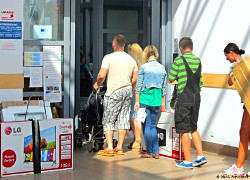What authorities are afraid of?
11- 1.10.2014, 14:16
- 31,311

Minsk continues to delay the project on small cross-border movement.
Belarusians are banned from crossing the border with Latvia, Lithuania and Poland on foot from October 1. The official explanation is the absence of infrastructure (special terminals and checkpoints). Due to a large flow of people and freight, Minsk will impede the implementation of the reached agreements on the small cross-border movement.
The authorities worry more about lifting EU visa sanctions from Belarusian officials in exchange for freedom of movement than safety and comfort of pedestrians with Schengen visas, Deutsche Welle reports.
There's nothing more permanent than temporary
The Belarusians, who could visit the EU countries freely yesterday, don't seem to be happy with the temporary ban on crossing the border on foot and the authorities' sudden desire to care about the comfort of citizens. Several hundreds of people lost the opportunity to cross the EU border on foot. Crossing the border on foot was used not only by small smugglers of alcohol and cigarettes, but also by ordinary people living near the border who want to visit their relatives and buy something in a Polish or Lithuanian shop without paying for transport.
Crossing the border by foot was allowed at the beginning of the year. At the Vilnius Eastern Partnership Summit in November 2013, Belarusian foreign minister Uladzimir Makei said the country was ready to facilitate the visa regime with the EU. The decision to allow crossing the border for pedestrians promised more freedom of movement for Belarusian citizens.
Minsk couldn't but knew that the infrastructure of ten checkpoints for vehicles did not fit the flows of pedestrians wanting to enter the neighbouring EU countries. At the same time, Poland opened a special lane for pedestrians.
The cross-border movement saga
It is now clear that a few days are not enough to create the necessary infrastructure, all the more so that money was not provided for the project. It means that people have to wait months and years for the pedestrian movement to be resumed.
Aliaksandr Lukashenka repeatedly demanded that the EU should back the purchase of equipment for border crossings if the Europeans don't want to see flows of smuggled goods and illegal drugs:
“Give us money and equipment.” It's worth noting that in accordance with technical cooperation programmes with the EU, Belarus receives tens of millions of dollars annually to improve the border safety and raise efficiency of the customs control.
However, the Belarusian authorities didn't upgrade border crossings for pedestrians at the expense of the state budget. Crossing the EU border on foot is only a part of the small cross-border movement agreement. Belarus has been delaying signing it for several years for different reasons: absence of forms to print special passes or wrong assessment of the political situation in Belarus by Poland. Now they recalled that there's no infrastructure.
What the authorities are afraid of
The whole small border movement project is likely to be frozen with the pedestrian movement across the border. It cannot be implement if there are no opportunities to organise the movement of large flows of people and freight.
The reasons for Minsk's unwillingness to give the green light to the ratified agreements on small border movement with Poland and Lithuania are not the absence of special terminals on the Belarusian border. Firstly, the authorities don't like that the Belarusians spend hundreds of million of dollars abroad buying goods at lower prices.
Secondly, freedom of movement change the consciousness of people. They compare life in Belarus with life in Poland and Lithuania and begin to put uncomfortable questions to officials.
Thirdly, if the small border movement project is implemented, almost two million of Belarusians living near borders will be able to visit Europe without visas, while Aliaksnadr Lukashenka and almost 200 officials will remain on the EU blacklist unless the Belarusian political prisoners are released.









